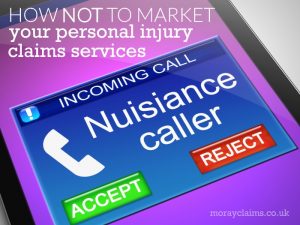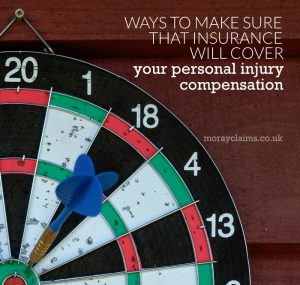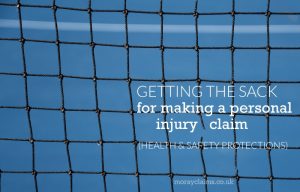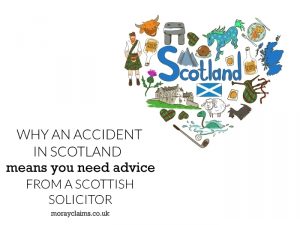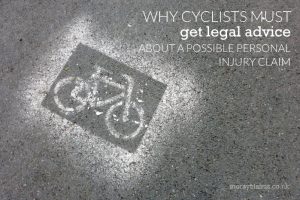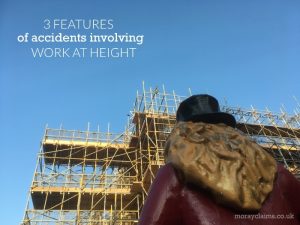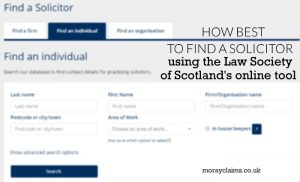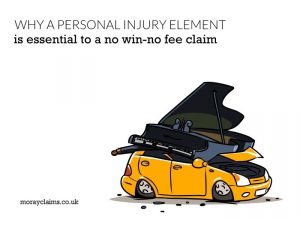That's right. You don't spell it "nuisiance". But spelling mistakes in stock photography are not regarded as a nuisance at Moray Claims. They brighten our day. Anyhow... Like all businesses, law firms must market their products and services. In the end, it all comes down to trust. Having a website with a wide range of educational information is part of the process of encouraging you to get to know, like and trust the solicitors (or other legal services provider) marketing their services to you online. Beyond that, the first impression you get - when you pluck up the courage to contact a solicitor - will be important to you. Most websites have contact forms you can fill in and submit. Should you choose to make contact by phone, however - How long does it take for the telephone to be answered? How long will it take for your call to be transferred to a solicitor who might actually be able to deal with your case? One thing which comes up repeatedly in advice Continue Reading
Ways to make sure that insurance will cover payment of your personal injury claim compensation
One of the first things a personal injury solicitor will consider, if you have a potential claim, is how you are going to get paid. (Yes, they’ll also think about how they might get paid for any work they do, but the first consideration has to be how easily you will recover compensation). It’s partly about whether you’re likely to be entitled to compensation - can you prove breach of duty or negligence? Fundamentally, though, it’s about ensuring as far as possible that, assuming your claim does succeed, someone will be there to pick up the tab – to pay you the compensation. Ideally, you want to know that there is insurance cover and that an insurance company will pay out on your claim. In this article, we will look at three aspects of insurance in relation to personal injury claims. Firstly, when can it happen that there is no insurance? Second, in which situations ought there to be insurance to cover personal injury compensation? And, finally, what steps does the law take to Continue Reading
Getting the sack for making a personal injury claim (health and safety protections)
The fear of being dismissed. It’s a fear that prevents many people claiming compensation for personal injury sustained at work. We’ve considered this general issue in other articles. In this article, we focus on protections which might apply via employment law, and health and safety law. It’s a discussion of health and safety at work, workplace danger and sections 44 and 100 of the Employment Rights Act 1996. Employers have extensive health and safety duties towards employees. And also to workers, self-employed people and visitors to their workplaces. The principal legislation in relation to health and safety is the Health and Safety at Work Act 1974. This sets out basic health and safety duties. They apply to companies, directors, managers and employees. As the director or owner of a company, you have potential personal liability as well: you can't hide behind your company. The nature and extent of the duties in practice will depend very much on the type of business concerned. The Continue Reading
Why an accident in Scotland means you need advice from a Scottish solicitor
If you have an accident in Scotland, you need to get advice from a Scottish solicitor. People contact us with personal injury related questions via this website from all over the place (not always in the UK and not always even in Europe). Where the enquiry is about an accident that happened outwith Scotland, we cannot help you directly but we can often use our professional contacts to point you in the right direction. It’s even more focused than "Scotland" for us, however, because we concentrate our main efforts on helping clients in our home area of Moray and a bit beyond that. One phone enquiry we received recently caused us a lot of concern and that’s the seed for this article: The risk that you might have a question about injuries arising from an accident in Scotland but not get advice from a Scottish solicitor. Here’s (an anonymised version of) the scenario that came from the phone enquiry mentioned above. A parent of the caller had died as the result of a road Continue Reading
Why cyclists must get legal advice about a possible personal injury claim
The volume of water that breaks off Antartica as icebergs each year is greater than the total global consumption of freshwater. And icebergs are pure freshwater. Not for the first time, schemes have been proposed to tow icebergs to hot, water-stressed regions of the world. In Spring 2018, for example, before the rains finally came, the four million people in Cape Town, South Africa, came perilously close to ‘Day Zero’ – when they would run out of water. Though the idea of using icebergs in this way originated as long ago as the 19th Century, no plan has ever been put into action. The idea makes even more sense when you think of icebergs otherwise being “wasted” by melting into the salty seas. Of course, another feature of icebergs is that much more of them lie below the waterline than above. Ships need to be aware that initial appearances are deceptive where icebergs are concerned. In this article, we are going to consider why a superficial approach does not work and why Continue Reading
5 tradesman-related issues to consider if you are getting work done on your house
At Grigor & Young (Moray Claims is a trading name of Grigor & Young) we get a lot of enquiries from people who need legal advice in relation to work done on their house, usually somewhere in Moray. This covers everything from new builds to renovations and extensions. The types of contractors involved include builders, electricians, plumbers, joiners and double-glazing companies. In varying degrees, these situations are a "nightmare" and, as we go on to explain below, it is often not financially realistic to engage the services of a solicitor to help you. Essentially, this article is an effort to warn you of the need to plan and organise various things at the beginning rather than leaving them until later - when things have already gone wrong and it's "too late". Unlike many articles on this website, while we still hope to educate and inform you, we're not hoping to get business from it... If you’re going to get work done on your property, here are 5 things to Continue Reading
3 Important Features of Accidents involving Work at Height
Sunday, 26 August 2018 marked the 90th anniversary of the “snail in the ginger beer bottle” incident. While enjoying a drink with a friend in the Wellmeadow Café in Paisley, May Donoghue found an unwelcome addition to the contents of her bottled drink in the form of a decomposing snail. The injury she suffered when she drank the unpleasant mixture gave rise to the case of Donoghue –v- Stevenson, one of the most famous personal injury cases of all time. Though you would more readily link cheese with a mouse than ginger beer with a snail, it was ironic that a dead animal should again feature in a personal injury scenario reported so close to Donoghue –v- Stevenson’s 90th anniversary. On 22 August 2018, Kirkwall Sheriff Court dealt with a criminal prosecution arising out of an accident in a cheese factory in Orkney. A dead mouse caused an employee to have to work at a height from which he (the employee) fell and suffered injury. In this article, we will look at three aspects of work Continue Reading
Why would you want to become a Personal Injury Solicitor?
When I was a child, my parents used to get the Reader’s Digest and I was fascinated by a regular feature in that, called "Drama in Real Life". They would have titles like: One Handhold from Death, 'Pull me out!' and The man who wouldn't jump. These articles would tell the story of how do someone survived a situation of great personal peril, which could be anything from a natural disaster to a hotel fire or an accident at work. Often, other people involved in the situation did not make it out alive. This would get me thinking about how better precautions or preventative measures might have been taken so as to avoid the injury and loss of life. As I grew older, I remember feelings of frustration in situations where I felt powerless because I did not know my legal rights. It has been said that "If you don't know your rights, you don't have any". What I perceived as injustice in many situations really frustrated me. It got me thinking that, if I knew about my own rights letter, Continue Reading
How best to find a Personal Injury Solicitor using the Law Society of Scotland’s Online Tool
(NOTE: This post contains a screencast video, below, with a walk-through of how best to use the Law Society of Scotland's "Find a Solicitor" Online Tool to locate a specialist personal injury solicitor who is local to you). You don’t have to use the solicitors your insurers may tell you to use for your personal injury claim. We recommend you to get help from a solicitor who meets two main criteria: They should be local, and they should be specialised. 1. Local solicitor We recommend you to engage the services of a local solicitor, if possible. What do we mean by local? Ideally, a solicitor who is local to you and local to the location of the accident. Even getting a solicitor who is local in only one of these two ways is probably better than a solicitor who is neither close to you nor the place where the accident happened. 2. Specialist solicitor These days, all solicitors are specialists to some extent. Personal injury law is a complex area and you need Continue Reading
Why a personal injury element is essential to a no win-no fee claim
Or, to put it another way, why don’t pure property damage claims work no win no fee? Dealing with motor insurers can be a frustrating process. This article was prompted by a question via the Grigor & Young website. The person making the enquiry said of their dealings with the third party insurers: It is an ‘online’ process and one is left for long periods of time on the telephone (twice my phone has run out of power from being fully charged) while trying to get a response. The enquirer had been involved in a road traffic accident that was not their fault. Their car was damaged and needed repairs. The car belonged to one of their parents. They were insured to drive the parent’s car through their comprehensive insurance on their own car. Ordinarily, in a “comprehensive” scenario, you may well choose to claim under your own policy (even if the accident was not your fault) because you have a contract with your insurers. You have more control. You have more clout if Continue Reading
9 Questions to ask your Legal Expenses Insurer if you want your own solicitor to handle your personal injury claim
In other articles, we have discussed how legal expenses insurance can help minimise the cost risk to you if you need to make a personal injury claim for compensation. The term “legal expenses insurance” can include both before-the-event (BTE) insurance and after-the-event (ATE) insurance. With ATE insurance, the insurance policy is taken out after the accident in order to cover the risk of having to pay the opponent’s legal costs (for example, if you raise a court action but the claim fails and you lose). BTE insurance covers against future legal costs but was in place before the event which gave rise to the claim, such as the accident which has caused the personal injury for which you need to claim compensation. BTE insurance generally limits your freedom to choose your own legal representative because claimants are directed to use firms of solicitors which are on the BTE insurer’s approved panel. Panel firms may be located a considerable distance from your home, especially Continue Reading
Why you should always make use of insurance, if you have it
We criticise insurance companies on this blog quite often. Of course, insurance companies are frequently critical of solicitors who help people to make personal injury claims. They are also critical of claimants themselves. As well as people with possible personal injury compensation claims, we get a lot of enquiries from people who are worried that some sort of compensation claim might be made against them. If they have insurance cover, they are not sure if they should use it. If you have insurance that will help you defend a claim against you for personal injury (or property damage), you should make use of it. Here are a couple of very recent examples. The first scenario is a road traffic accident. Of course, in theory, it is compulsory to have motor insurance to cover you against the risk of liability to a 3rd party. In this case, the person making the enquiry to us had been driving at night in a suburban area. There was street lighting. The car in front was Continue Reading
